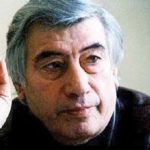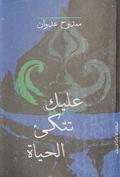Mamdouh Udwan 1941- 2004
Source: Peter Clark
Tuesday January 25, 2005
The Guardian
Mamdouh Udwan, who has died of cancer aged 63, was one of Syria's best-known writers. He distinguished himself as poet, novelist, dramatist, critic and translator. A rebel and a champion of liberty, he was uneasily respected by the Syrian establishment.
Mamdouh was born in Qayrun, near Masyaf in central Syria. He studied English at the University of Damascus and became one of a group of bright young men and women who came from rural and often Alawite backgrounds and challenged the presumptions of the generation that preceded them. They were the cultural but not uncritical allies of the Ba'athist regimes that have controlled Syria since the 1960s.
Mamdouh started his career as a journalist, before working for the translation department of the ministry of information. He continued to be a contributor to the Arab press for the rest of his life.
His first collection of poems, The Green Shadow (1967), was the first of 27 small volumes. Three years later he published his first - of 24 - plays, The Man Who Did Not Fight. He went on to publish two novels and translated 23 works from English, introducing new writers to the Arab reader, such as the Cameroonian Ferdinand Oyono and the Chilean Antonio Skarmeta. In his major novel, My Enemies, he writes of Syria in the last days of Ottoman rule, castigating the repression of the Turkish governor, Jamal Pasha.
Mamdouh's work combines humour and tragedy. He was ferocious in his denunciation of corruption and despotism. He broke away from stereotyping Jews. In My Enemies they laugh and weep rather than threaten and fight. In this historical novel there is always a message for the present. His language was simple and direct and he was an enemy of official cant, "cruel dreams coupled with cruel bread", as he put it in one of his poems. His plays present the dilemmas of contemporary citizens. One play, The Mask, has been performed in English, and explores the situation of a 30-something Damascus career girl living alone.
Friends found his prolific output a mystery, for he was a lover of life, with a gift for friendship and conversation - his contributions accompanied by a wry chuckle. He always had time for other people, and encouraged young talent, especially when it came those from his own rural background.
In 1994, he was a visiting scholar at the Woodrow Wilson International Centre in Washington DC, and in 1997 won the Jordanian Arar Prize for poetry.
He is survived by his wife Ilham and three children.






